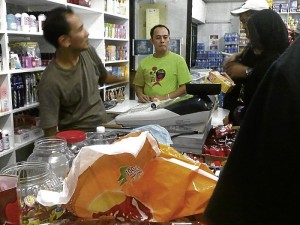OFWs in Saudi Arabia reeling from high cost of living

Overseas Filipino workers are complaining of high prices in Riyadh and other cities in Saudi Arabia. Photo from Pinoy Xtra
RIYADH—There has been a furor of late regarding Nitaqat, the new Saudization program of the Kingdom which gives priority to Saudi manpower for employment opportunities in local companies.
But there’s another problem which has become more endemic, particularly among expatriates like overseas Filipino workers (OFWs). This is the marked increase in consumer prices.
“The cost of basic needs—from services rendered, to consumer goods and housing—have gone up. This is because government control is not yet in place. If a flat owner, for example, wants to increase rent, he could do so,” said Francisco “Boy” Naval, an engineer and chairman of the board of trustees of the 8,000-member United OFW in Riyadh.
It started even before the financial crisis that affected all countries all over the world some three years back, including Saudi Arabia, where a relatively comfortable life was being enjoyed by expats.
For many OFWs, especially those drawing relatively high salaries at the end of each month, life here is still comfortable—but not too many, such as the ordinary workers.
Many of them—like tea boys and cleaners—are only receiving from SR300 to SR600 monthly. This is especially true among those working for manpower suppliers. Lucky ones could get as much as SR1,000, which is still a poor man’s pay by Saudi standards.
At current exchange rates, one Saudi Riyal is equivalent to P11.35.
The increased cost of living has caused OFWs to complain. Erik P. Asi, an electrical engineer at Nardeen Lighting in Riyadh, said that a 5–kilo bag of Wag-Wag rice used to cost SR14 about three years back. Now, he said, it costs SR25.
“The cost of fish has likewise increased. Hasa-hasa, for instance, used to cost SR4. Now, the cost ranges from SR10 to SR12,” he added.
He also said that corned beef imported from Brazil used to cost SR6 but now it costs SR8 or more.
(When this reporter arrived in Riyadh on July 22, 1986 to work for the defunct Riyadh Daily which closed down on December 31, 2003, the cost of a well-known corned beef brand imported from Brail was about SR4.45 to SR4.50. Now, this brand costs more than SR10.)
“A can of evaporated milk used to cost SR1. Now, it has increased by 50%,” he said. To be able to cut down on costs, he and wife, the former Jannete Arenque of Lopez, Quezon, have scheduled days for going to the supermarket for shopping.
“We avoid going to the shop unnecessarily. We may buy something which we don’t essentially need. We’d rather save the money for the education of our two kids,” he said.
Fast-food snacks up
In Buraidah, Qassim province, some 375 km. north of the Saudi capital, OFWs have the same complaint. Dionisio B. Tabuco Jr., a mechanical engineer working for the Saudi Pharmaceutical Industries and Medical Appliances Corp. (SPIMACO), noted that a box containing 10 pieces of chicken was only SR60 to SR65 three years back.
“Now it costs SR90. It is higher for leading brands,” he said, adding that branded fast-food chains used to sell a box of chicken for SR11-SR12. “Now, a box costs SR19 which includes a softdrink and salad,” he said.
Citing a more common example, he said that a can of soda used to cost only SR1 but now it costs SR1.50. To attract more customers, a restaurant catering to the Filipino community in the Saudi capital sells softdrinks for only SR1.To sweeten its offer, it also offers free drinking water.
For this reason, the restaurant gives the impression that the food it serves is cheap, aside from the fact that it serves mainly fish and vegetables which are good for health. It may be mentioned here that heart attack is the leading cause of death among Filipinos in the Kingdom.
But it’s not only the prices of commodities which have gone up. House rents have skyrocketed as well.
In Jeddah, Lowell Plameras, managing director of The Media Brokers, said, “I used to pay SR12,000 yearly for my flat in Sharafiah district. Now I am paying SR18,000.”
He said that he could not transfer because he’s come to like the place, aside from the fact that increasing rent has become the trend all over the Kingdom.
“I like the neighborhood. It’s peaceful. Many of my neighbors have also become my friends. So, even if I pay more, I’d stay where I am staying now, although I wish my landlord had not increased my rent ,” he said.
Helpless as they are, OFWs and other expats have found an ally in the Jeddah-based National Society for Human Rights (NSHR), which has requested the Ministry of Commerce and Industry, and municipalities to do their part to intervene and stop the marked increase in consumer prices.
Consumer protection
It plans to prepare and submit a new draft of a new consumer protection system to the Royal Court.
“There is no doubt that the consumer is the weakest link in the trade relationship as there is no law or system that can provide consumer protection or that supports regulatory services by the Ministry of Commerce to make sure there are substantial reasons behind price elevation,” NSHR President Mofieh Al-Qahtani was quoted saying by Arab News.
He said that the NSHR had received a number of complaints and grievances.
Al-Qahtani also mentioned that the rise in residential and commercial rental properties leads to a subsequent rise in the cost of goods and services.
“Despite our belief there exists external causes that may have led to higher prices, such as the higher costs of imports, transportation and insurance. There are goods and services that have been the subject of steep price increases without explanation,” Al-Qahtani said.
One suggestion is the establishment of a national center that would monitor prices as well as costs to ensure the price increases are related to legitimate inflationary pressure and not just attempts to gouge customers.
The human rights body also said that it would like to see price controls that limit annual increases of rent, as well as goods and services, to not more than five percent.
“We would like to call on all regulatory authorities responsible for consumer protection to do what is dictated by the law and control prices as well as periodically explain to consumers the reasons for the increase in prices to avoid further harm to their living conditions,” he said.
